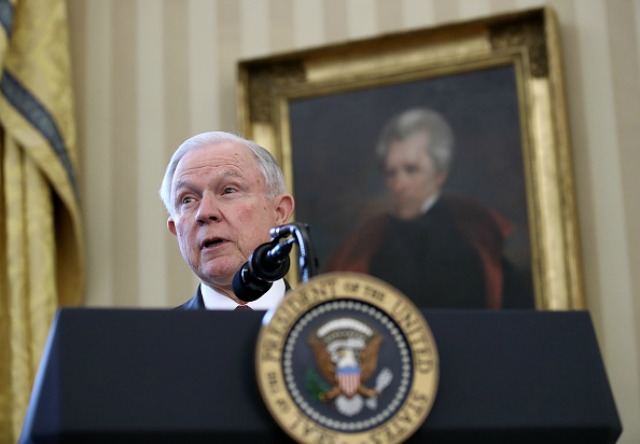Jeff Sessions Doubts DOJ Report On Chicago, Suggests 'Broken Window' Policing
By Stephen Gossett in News on Feb 28, 2017 5:25PM

Attorney General Jeff Sessions / Getty Images / Photo: Win McNamee
Updated 12:15 p.m. Attorney General Jeff Sessions on Monday expressed doubt about the findings of Department of Justice investigations into Chicago and Ferguson, Missouri police departments, both of which raised red flags about each department's use of force, among other harshly critical findings. Sessions also criticized the Chicago Police Department's for making fewer arrests and stops, and again connected low police morale with the city's violent crime rate.
Sessions characterized the reports as "pretty anecdotal and not so scientifically based”—although he also admitted he had only read summaries, and not the actual full reports.
“You have 800,000 police in America, imagine a city of 800,000 people," Sessions said, according to ABC News. "There's going to be some crime in it, some people are going to make errors."
After a 13-month investigation, the Justice Department released a scathing report in January which concluded that the Chicago Police Department engaged in a pattern or practice of using force—including use of deadly force—that violates the Fourth Amendment of the Constitution.
According to the DOJ, the department while investigating CPD "heard from over 1,000 community members and more than 90 community organizations; reviewed thousands of pages of police documents, including all relevant policies, procedures, training and materials; and analyzed a randomized, representative sample of force reports and the investigative files for incidents that occurred between January 2011 and April 2016, including over 170 officer-involved shooting investigations and documents related to over 400 additional force incidents."
Then-Attorney General Loretta Lynch said in January, “One of my highest priorities… has been to ensure that every American enjoys police protection that is lawful, responsive, and transparent. Sadly, our thorough investigation into the Chicago Police Department found that far too many residents of this proud city have not received that kind of policing."
“Quite simply, as a department, we need to do better," said CPD Superintendent Eddie Johnson at the time of the report’s release. He called the findings “difficult to read.”
On Monday, Sessions also leant credence to the oft-criticized "broken windows" theory of policing in specific reference to Chicago. Sessions said, according to Politico:
“I'm really worried about Chicago with the surge in murders as well as the one data — one of the metrics that has been reported in Chicago shows a dramatic reduction in stops and arrests in Chicago by the police department. So they have the same number of officers but the number of people getting arrested for presumably smaller crimes — you know, the broken windows concept in New York … that [has] got to be a factor in the increase in violence in the city.”
Sessions said that police—the "frontline soldiers in the effort to keep the crime under control," as he described them, according to Huffington Post—in many departments are doing poorly "in terms of morale." Sessions had previously drawn a parallel between low officer morale and violent crime in cities like Chicago and Baltimore during his confirmation hearings in January.
Sessions reportedly pivoted to his comments about morale and "broken windows" when asked about whether the Department of Justice would negotiate the consent decree of the department's findings from the Chicago Police Department probe, an agreement with which the city and DOJ have an agreement in principal.
Chicago Mayor Rahm Emanuel responded to Sessions' comments Tuesday in response to questions from reporters during an unrelated event.
Emanuel said the city is committed to reforming its police department regardless of the consent decree.
"When the Justice Department report came, there were a lot of questions, and I've been very clear we're going to continue to do what's in our self-interest as it relates to training, technology, transparency and leadership, so our police officers have the support, the confidence to do their job," Emanuel said, according to the Tribune. "Reform and proactive policing go hand in hand with each other."
Sessions will address the National Association of Attorneys General on Tuesday.